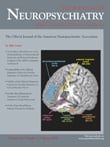To the Editor: An 86-year-old female was hospitalized to undergo a mastectomy for breast cancer in the right breast. The patient’s medical history included surgery for skin cancer at age 75, and postoperative delirium. Given this history, the surgeon consulted a psychiatrist about presurgical treatment at the time of hospitalization.
At age 79, the patient was diagnosed with depression and prescribed 100 mg of amantadine, 100 mg of sulpilide, and 0.5 mg of etizolam by the clinic psychiatrist. In Japan, psychiatrists occasionally prescribe sulpilide instead of a selective serotonin reuptake inhibitor (SSRI) or a tetra-cyclic antidepressant. Etizolam is an antianxiety drug unique to Japan and is prescribed with expectations of antianxiety effects similar to that of lorazepam. However, since the patient experienced a relapse at age 84 during treatment, 20 mg of paroxetine and 7.5 mg of zopiclone for insomnia were additionally prescribed. These drugs continued to be administered concurrently to the three drugs originally prescribed (e.g., amantadine).
Discontinuing the use of a drug for 3 days or longer may lead to paroxetine and etizolam withdrawal. Although there have been reports of acute delirium
1 or neuroleptic malignant syndrome
2 after withdrawal of amantadine, discontinuation of amantadine does not commonly induce withdrawal symptoms. Discontinuation of zopiclone is known to cause insomnia.
Since the operation was to be conducted under global anesthesia through the inhalation of sevoflurane, oral medication of all drugs was cancelled for the day of operation. When psychotropic therapy was readministered, the psychiatrist decided to remove amantadine from the regimen given its risk of delirium. The day after the operation, the patient showed signs of finger tremors in both hands; however, tremors disappeared by the second day.
The patient presented neither withdrawal symptoms from sulpilide or etizolam (such as anxiety or depression), nor from paroxetine (such as nausea, stomachaches, and perspiration). There were also no signs of insomnia due to the discontinuation of zopiclone administration or signs of postoperative delirium. Thus, we intimate that the finger tremors observed postsurgery were a result of withdrawal symptoms from amantadine.
On the evening of the second day after the surgery, administrations of all medications used prior to hospitalization, excluding amantadine, were resumed. The patient steadily recovered with no significant problems that interfered with postoperative rehabilitation and was discharged from the hospital 13 days later.
This case reported the discontinuation of long-term amantadine medication that resulted in finger tremors for a day, which then disappeared without readministering the drug.

